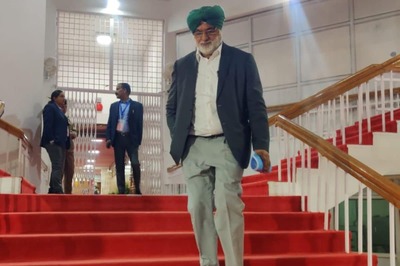
views
Islamabad: Military leaders of Pakistan and the US have held a flurry of meetings over the past week aimed at easing tensions in bilateral ties, with the Foreign Office saying that Islamabad is trying to convert "strategic convergence" into gains for both countries.
The outgoing commander of US forces in Afghanistan, Gen David Petraeus, and his successor-to-be, Lt Gen John Allen, met Pakistan Army chief Gen Ashfaq Parvez Kayani on Thursday.
This was preceded by US central command chief Gen James Mattis' visit to Islamabad and ISI chief Lt Gen Ahmed Shuja Pasha's trip to Washington.
Reports have indicated that the two sides held discussions on easing tensions that reached a new high after the covert US raid that killed Osama bin Laden in the garrison city of Abbottabad on May 2.
However, the ties continue to be affected by severe strains, as reflected in the recent US decision to suspend military aid worth $800 million to Pakistan.
One issue that reportedly figured in the recent discussions was a US plan to shift the focus of the war in Afghanistan from that country's southern region to the eastern part bordering Pakistan.
Islamabad too has been pressing US and Afghan forces to do more to tackle militants based in Kunar, Khost and Nuristan who are launching attacks inside Pakistan.
Foreign Office spokesperson Tehmina Janjua said the two sides would have to focus on common ground in strategic objectives to ensure gains for both countries.
"We believe strategic convergence exists between the two sides, which we are working to convert into a win-win situation for both sides," she told a news briefing on Saturday.
"Course correction, in accordance with the resolution of the joint session of the parliament, is being undertaken wherever required," Janjua said, referring to a resolution passed by a special session of the two houses of parliament in the wake of the raid against bin Laden that had called for a review of ties with the US.
However, experts believe the two sides will have to cover a lot of ground to overcome the tensions and differences that have characterised relations since the beginning of this year.
The tensions erupted after CIA contractor Raymond Davis shot and killed two armed Pakistani men in Lahore in January.
In the wake of the raid against bin Laden, US officials have alleged that elements in the Pakistani military leaked information provided by US about bomb making factories in the tribal belt to militant groups.
The US, which has been pressuring Pakistan to take firm action against militant groups, was also angered when Islamabad expelled dozens of American military trainers.
On the other hand, the Pakistani military is suspicious about the US role in Afghanistan and has been insisting that Islamabad should have a direct role in negotiations with the Taliban to find a political settlement in the war-torn country.
Pakistan also does not want India to have a prominent role in Afghanistan.
The US has indicated that it wants to retain contacts with Pakistan as the two sides work on irritants in military-to-military ties.
US Deputy Secretary of State Thomas Nides recently assured Finance Minister Abdul Hafeez Sheikh that the Obama administration would continue providing civilian aid despite the suspension of military assistance.
"With regards to the military assistance, discussions are ongoing. Of course, I would like to reiterate that Pakistan attaches importance to its relations with the US. Sodoes the US," said spokesperson Janjua.




















Comments
0 comment